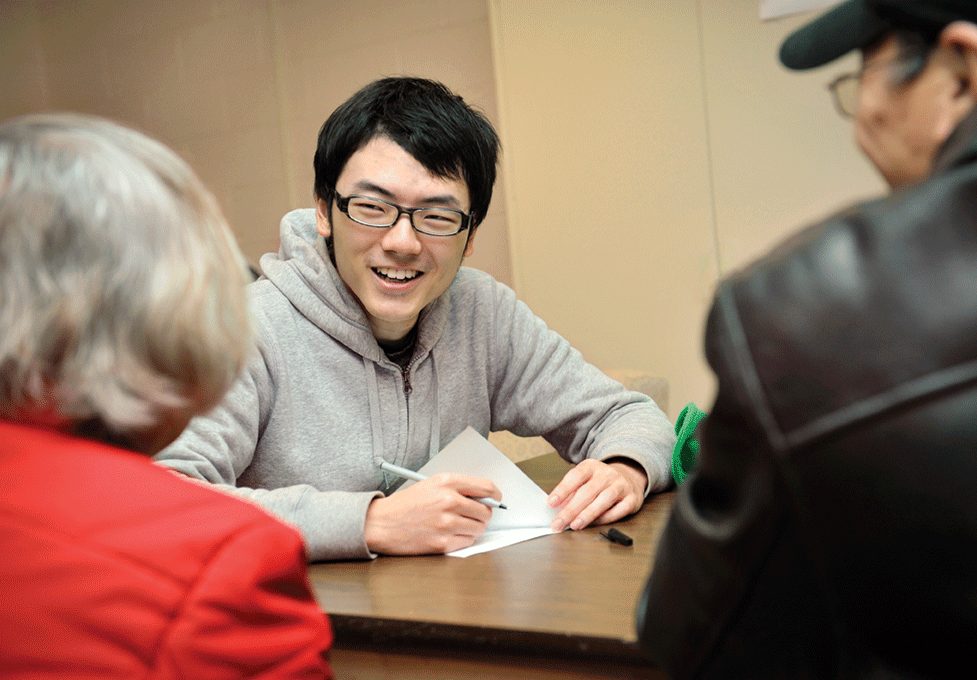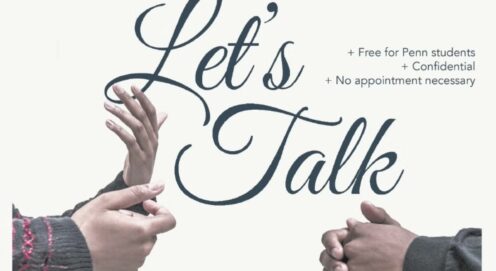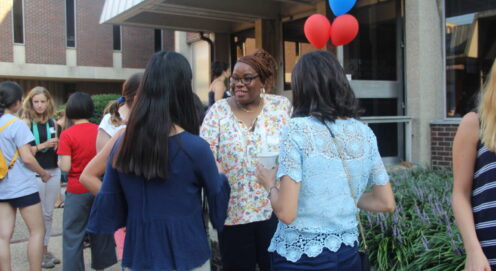Practicum Placement
Where theory meets practice
Practicum education is an integral part of our overall MSW curriculum, allowing students to encounter real-world learning experiences directly related to their classroom curriculum. By working with SP2’s partner agencies, students gain the opportunity to test what they have learned as a means of evaluating their own social work practice.
Practicum education is systematically designed, supervised, and evaluated based on criteria developed in accordance with CSWE education standards. Practicum placements are determined based on academic expectation, the students’ educational needs and objectives, and agency opportunities.
Student experiences in practicum are also integrated into classroom work and learning.
MSW students must complete two practicums in social service. We have an ever-evolving database of over 900 agencies. We strive to have varied learning opportunities for our students that include, among many areas of practice, child welfare, health, and education. Each year, the MSW Practicum Education Office is responsible for ongoing evaluation of agency placements, maintaining existing agency relationships and developing new sites. In a typical year, up to 35 new agencies are developed.
All practicum placements and arrangements are made by the School.
State law and/or particular practicum sites may require background checks and particular onboarding procedures before a student will be permitted to do fieldwork in a number of contexts. Certain kinds of criminal convictions may affect a student’s ability to obtain a practicum placement, which, in turn, could affect the student’s ability to complete degree requirements.
Where Do SP2 Students Have Practicum?
SP2 students have completed practicum placements at agencies, schools, and hospitals across greater Philadelphia.
Placements | A-F
- Abington Family Medicine
- Abington Hospital – Hospital Homecare and Hospice
- Abington Jefferson Memorial Hospital – Ambulatory Services
- Abington Jefferson Memorial Hospital – Muller Institute for Senior Health
- Abramson at Penn – Patient and Family Services
- Abramson Cancer Ctr at Penn Presbyterian UPenn – Outpatient Hematology Oncology
- AJ Drexel Autism Institute – Philadelphia Autism Project
- Albert Einstein Medical Center – Transplant
- AVP – Family of Murder Victims Counseling Center
- Beachwood Elementary
- Belmont Behavioral Health
- Belmont BH – Adolescent Inpatient Unit
- Bensalem High School
- Bethesda Project – Our Brother’s Place Shelter Social Services
- Capital Health Regional Medical Center – Trenton
- Carson Valley Children’s Aid – Behavioral Health Rehabilitation Services (BHRS)
- CASA Phila – Education Decision Makers
- Catholic Charities Berks County Office – Reading Office
- Catholic Charities/ Diocese of Trenton – Family Growth Program
- Catholic Social Services Archdiocese of Phila – St. Charles Senior Center
- Catholic Social Services Archdiocese of Phila – Star Harbor
- Center for Family Services – Family Preservation Services
- Center for Family Services – Juntos Program
- Center for Family Services, Inc. – TIP Program (TANF Initiative for Parents)
- Children and Families First – Foster Care and Adoption
- Children’s Crisis Treatment Center
- Children’s Hospital of Philadelphia
- Community Legal Services
- Congreso
- Consortium
- Cooper University Hospital
- Creative Health Svcs MH OP Dept – Family Based Services
- Crozer Chester Medical Center Community Hospital
- Davita – Renal Center of Philadelphia
- Davita Healthcare Partners, Inc.
- Defender Assoc of Philadelphia
- Delaware Valley Community Health, Inc.
- Drucker Brain Injury Center – Elkins Park (Main Hospital)
- Early Childhood Treatment Program
- Edison Court, Inc. (Mathom House and Ravenhill Psychological)
- EducationWorks – Philadelphia Office
- Episcopal Community Services
- Fairmount Behavioral Health
- Families Forward – Community Housing Program
- Family Support Services – Healthy Start Program
- Family Svc Assoc of Egg Harbor – Outpatient Adolescent and Adult
- Friends Hospital
Placements | G-L
- Goldring Reentry Initiative
- Good Shepherd Penn Partners LLC – Brain Injury Floor
- Greater Trenton Behavioral Health Care – Adult Day Treatment
- Hampton Hospital – Behavioral Health Center
- Hartnett Health Services
- Health Federation of Philadelphia – Trauma Advocacy Program
- HIAS – Asylee Outreach Program
- HIAS & Council Migration Services of Philadelphia
- Hispanic Family Center of Southern, NJ
- Horizon House
- Horsham Clinic
- Hospice of Lancaster County – Hospice and Community Care
- Hospital of the University of Pennsylvania Social Work
- Inglis House – Adult Day Program
- Jefferson Northeast Hospital – Torresdale Cancer Center
- JEVS Human Services
- Jewish Family and Children’s Services of Greater Philadelphia
- Journey’s Way Geriatric Counseling Service
- KIPP DuBois Collegiate Academy
- KIPP Phila – Middle School
- KIPP Phila Elementary Academy
- KIPP West Phila – Elementary Philadelphia
- Lankenau – Oncology
- Life Counseling Services
- Livengrin – Partial Hospitalization/IOP
- Lutheran Children and Family Service of Pennsylvania
- Lutheran Settlement House
Placements | M-R
- Mastery Charter Schools
- Maternity Care Coalition
- Mazzoni Center
- MCC – Warwick House
- Medical Examiner’s Office of Phila – Bereavement Support
- Merakey – PACT Program
- Merakey Delaware County
- Merakey Lehigh
- Merakey Parkside Recovery
- Mural Arts – Color Me Back; A Same Day
- Work and Pay Program
- Mural Arts – Kensington Storefront
- Mural Arts – Southeast By Southeast Community Center
- Nationalities Service Center
- Nemours-AI duPont Hosp
- Netter Ctr – Government and Community Affairs
- NewVitae – Philadelphia South Street
- Oaks – Family Learning Center
- Office of Climate and Safety Philadelphia School District
- Pathways – Supervised Independent Living
- PCCYFS – Southeast Regional Office
- Penn – Cognitive Outpatient Neurology
- Penn Foundation for Mental Health
- Penn Home Care & Rittenhouse Hospice
- Penn Integrated Care
- Penn Internal Medicine Associates
- Penn Medicine Princeton House BH – Adult Programs
- Penn Presbyterian Hospital
- Pennsylvania Hospital Social Work
- Pennsylvania Law School – Child Advocacy Clinic
- People’s Emergency Center
- Philadelphia Family Court
- Philadelphia FIGHT
- Philadelphia Veterans Multi-Service & Education Center – Walker House (Coatesville)
- PIC – Family Medicine
- PMHCC – Office of Addiction Services
- Policy Lab at CHOP Research Institute – Roberts Center for Pediatric Research
- Preheim Center
- Project H.O.M.E.
- Public Health Management Corporation
- Red Shield Family Residence Salvation Army – Reed House
- Resources for Human Development
- Restore Health at University City – Chestnut Center for Nursing and Rehabilitation Center
- Rittenhouse Hospice – Bereavement
Placements | S-Z
- Saint Gabriel’s System
- Saint Gabriel’s System – Residential Treatment Program
- Saint Gabriel’s System – Saint Gabriel’s Hall
- Salvation Army – Booth Manor
- Salvation Army – Human Trafficking
- Salvation Army – Human Trafficking – Police Assisted Diversion (PAD) Program
- Salvation Army – Ivy Residence
- Salvation Army – New Day House
- Sayre Health Initiatives, Education, and Leadership Development program (SHIELD)
- SEAMAAC
- Springfield School District – Sabold and Scenic Hills Elementary Schools
- St. Christopher’s Hospital – Center for the Urban Child (Outpatient Ambulatory Clinic)
- GABRIEL’S SYSTEM COURT SERVICES
- Temple University Clinical Resource Management – Palliative Care
- Temple University Clinical Resource Management – Social Work Department at Episcopal Hospital
- The Center for Autism – Outpatient Therapy Services
- The Village – Outpatient
- Thomas Jefferson Univ. Hospital Behavioral Health
- Thomas Jefferson Univ. Hospital Social Work
- Thomas Jefferson University Hospital – Med/Surg Unit
- Thomas University Dept. of Pscyh. – IOP
- Turning Points for Children
- Twin Oaks – Charles Yates Center for Children & Families
- Twin Oaks – Family Learning Center
- United Way of Greater Philadelphia and Southern New Jersey
- University of Pennsylvania HIV Clinical Trials Unit – HIV Prevention Research Division
- University of Pennsylvania Princeton House – Moorestown
- Upper Dublin School District – Sandy Run Middle School
- Valley Youth House – Lehigh Valley Programs
- Valley Youth House II – Supervised Independent Living
- Veteran’s Affairs Medical Center – Philadelphia
- Veteran’s Multi-Service Center – Education Center
- Veteran’s Multi-Service Center – Permanent Supportive Housing & Rapid ReHousing Programs
- Veterans Upward Bound Program
- Vitas Health Care Corp. Innovative Hospice Care – Inpatient Unit at Nazereth Hospital
- Wedge – Frankford Avenue
- Wedge – North Broad Street
- Wedge – Psychiatry: Juniper Street
- Wissahickon Charter School – Awbury Campus
- Women Against Abuse
- Women Organized Against Rape
- Wordsworth Academy
- Y.A.L.E. School
- Y.A.L.E. School – Camden County College
- Y.A.L.E. School – Cherry Hill
- Youth Detention Intervention Unit
- Youth Service, Inc.

Practicum Placement Dates & Details
The practicum education calendar is partially dependent upon the MSW program of enrollment.
Full-time students begin practicum in September and finish at the end of the spring semester for both years of the program.
Advanced Standing students begin practicum in the first week of July and finish at the end of the spring semester.
Part-time students have two different start and end dates for practicum:
- The Foundation (1st year) placement begins in September alongside the full-time two-year students. In order to complete the required number of hours, students finish placement in the last week of June.
- The Advanced (2nd year) placement begins in early August in order to provide ample time to complete required practicum hours. Students finish placement at the end of the spring semester, allowing them to graduate with their cohort.
View specific start dates, end dates, trainings, and holidays:
| Summer | Fall | Spring | |
| Full time 2 year: Foundation (1st year) | N/A | M, Th, F | M, Th, F |
| Full time 2 year: Advanced (2nd year) | N/A | M, T, F | M, T, F |
| Advanced Standing | July–August M, W, F | M, T, F | M, T, F |
| Part-time Foundation (1st year placement) | N/A | Days/times depend on student availability and agency options. | Days/times depend on student availability and agency options; however, 8 of the 16 hours/week occur during typical business hours. Students are expected to continue in practicum through the end of June. |
| Part-time Advanced (2nd year placement) | August start | Days/times depend on student availability and agency options. | Days/times depend on student availability and agency options. |
Practicum Education Manual
Find answers to frequently asked questions, as well as an in-depth explanation of the purpose and function of practicum education at SP2. This manual includes information for current students, prospective students, practicum instructors, and those interested in providing practicum education opportunities for SP2 students.
Supporting Trans & Gender-Nonconforming Youth in Schools
In Spring 2019, a group of students enrolled in SWRK 713: Understanding Social Change: Issues of Race and Gender created Understanding Policy 252, a resource guide for social work interns placed in Philadelphia public high schools around supporting trans youth.
Frequently asked questions
Can I choose my placement?
Students do not arrange their own placements. Your practicum placement is a significant part of your academic record and, as such, should originate from SP2’s Practicum Education Office. Practicum staff work in conjunction with practice faculty, practicum liaisons, and students to ensure that practicum experiences will support academic coursework and enhance professional growth.
For the Foundation Year (1st year) and Advanced Standing students, the Practicum Education Office reviews incoming students’ background, experience, and areas of interest to match students with agencies. Staff members use this information to make thoughtful decisions regarding where to place students. Students are notified of their placement by the Practicum Education Office.
Advanced (2nd year) students begin the process of securing their placement in January of their Foundation year (1st year). This group of students meets in-person with their practicum liaison in consultation with the Practicum Education Office to choose agencies and areas of practice for their Advanced Year placement. The Practicum Education Office provides a wide selection of placement options to consider.
Can I do my practicum where I work?
Students in all program options are invited to share their interest in pursuing a placement at their employment site with the MSW Practicum Education Office. Students interested in continuing in an approved employment-based placement or students who become unemployed in an organization where practicum education has co-occurred with employment, should contact the Practicum Education Office for guidance. Policies pertaining to employment-based placements are explained to students and practicum personnel during the practicum planning period.
For an employment site to be a successful placement, the following are required:
- You must have been employed for at least 6 months and have passed the probationary period.
- You must have a new supervisor for the hours dedicated to your placement, to distinguish practicum education supervision from employment supervision.
- You must be assigned to a new area of practice and new responsibilities in your agency for the hours dedicated to your placement, to distinguish practicum learning from employment.
- Practicum assignments must be directly linked to the nine social work competencies and level of practice (generalist/foundation year or specialized clinical or specialized macro year).
- If a student becomes unemployed from the organization where practicum education has co-occurred, the MSW Practicum Education Office will meet with the student to review the circumstances and determine the next steps for placement at the organization, placement at another organization, or in situations involving student performance, further consultation according to MSW Practicum Education policies related to student performance.
Will I receive a grade for placement?
Students will receive a written evaluation of their performance in their placement each semester of both years. Each student will receive a performance evaluation completed by their practicum site instructor toward the end of each semester. The evaluation aligns with the competencies required by the Council on Social Work Education (CSWE). Practicum performance is evaluated in terms of Pass, Marginal Pass, or Fail. This practicum evaluation is factored into grades for social work practice courses: SWRK 6040, SWRK 6140, SWRK 7040, SWRK 7140, SWRK 7080, and SWRK 7180.
Students also complete a Learning Contract with their practicum instructor at the start of each semester. The Learning Contract focuses on the students’ learning goals and aligns with the practice course objectives and the CSWE competencies.
Are there specific requirements that may impact my choice of a practicum placement site?
Some agencies require flexible work hours and/or days. FBI, Criminal Background, and/or Child Abuse clearances may be required. Occasionally a car for travel is required. Some agencies state that foreign language skills are beneficial for a successful placement experience.
If I am a part-time student, how many hours a week will I need to commit to placement?
Part-time students complete 16 hours per week in their practicum placements. In the Foundation Year, part-time students are in practicum from September through June. In the Advanced Year, part-time students complete their hours from August through the end of the Spring Semester. During both years, at least 8 of the 16 hours must be completed during the same day each week according to traditional business hours.
Does my practice site instructor have to hold an MSW degree?
All first-year Foundation placements must include supervision by someone who has an MSW degree. There are a limited number of circumstances in the foundation year where SP2 provides contracted MSW supervision. In the second year, SP2 offers an Integrative Seminar for students who are supervised by a supervisor who does not hold an MSW degree. No licensure is required for MSW supervision. Supervisors without an MSW must hold a Master’s degree in a related field.
Will I get to interview at my practicum placement?
It is expected that students will interview at their sites before they are accepted for placement. Some agencies are agreeable to phone or video interviews for students who are unable to interview in person due to geographical distance. Students are expected to prepare for these interviews in the same manner as a job interview. The Practicum Education Office is available by request to support students in preparation.
If I do not have a car, how will I be assigned to a practicum site?
The Practicum Education Office takes into consideration whether students have their own car or will require the use of public transportation to their agency. Students who do not have a car are expected to utilize public transportation. The Practicum Education Office considers a commute of up to 60 minutes each way by any form of transportation to be appropriate.
If I am planning to live outside of Pennsylvania and commute to classes, can I be placed in an agency near my residence?
The MSW Program at the University of Pennsylvania School of Social Policy & Practice is based in Philadelphia. The Practicum Education Office offers opportunities for placements in the Greater Philadelphia Tri-State Region. This area includes parts of Pennsylvania, Delaware, and New Jersey. The Practicum Education Office cannot guarantee that a placement outside of this area can be secured.
Events
07/15

Weingarten & SDS Info Session
Information session for students to learn about academic and disability support services at Penn including accommodations.
Events
07/15

Incoming Student/Alumni Networking Event – NYC
Casual networking event to allow incoming students and alumni in the NYC area to connect.
News
Faculty & Research
06/17

Report: Newark guaranteed income pilot shows positive financial, health, family, and housing impacts
New research from the Center for Guaranteed Income Research (CGIR) at Penn’s School of Social Policy & Practice (SP2) offers insight into the efficacy of different forms of unconditional cash transfers and reveals the positive impact of guaranteed income on low-income families in Newark, NJ.
Contact Us
Leslie A. Daniels, MSW, LSW
Director of MSW Practicum Education
215 573 9688
215 573 2099 (fax)
Jacinto J. Grant, MSW
Community-Engaged Professional Education Director
215 573 2099 (fax)